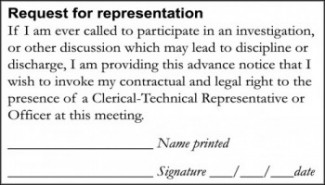Your supervisor calls you in for a meeting. You ask if discipline will be involved and if you need to call your union. No, no discipline, you are told, we just need to discuss your performance. As the meeting progresses, discipline is imposed. Your supervisor then claims that you did not ask for representation.
This situation highlights one of your most important union rights. When your supervisor begins to talk to you or question you about matters that could lead to discipline, the U.S. Supreme Court has ruled that you don’t have to face it alone. Your “Weingarten” rights, named after a 1975 court case, are printed on the back of your CTU membership card.
If you are called into a meeting, and you think it may lead to discipline, ask your supervisor a couple questions:
- What’s the purpose of this meeting?
- Is this a disciplinary meeting? Might it lead to discipline?
- Can I, or should I, contact my Union Representative?
When do I need representation?
Whenever you reasonably believe that discipline may occur you are entitled to have union representation. Discipline means oral reprimand, written reprimand, written record of a verbal warning, suspension, demotion, involuntary transfer/reassignment, termination or any other involuntary punitive change in your working conditions.
A reasonable belief that discipline may occur could result from direct statements, a hostile manner, office scuttlebutt or knowledge that a work problem has occurred. If you are unsure, request representation. If you have a question or anticipate a problem, contact your Union Representative. If you don’t have a UR, call the CTU office.
On this page is a notice that you may give to your supervisor in advance to make clear that you wish to have your right to representation should you ever need it. You may wish to submit it now so that you won’t have to worry if something comes up in the future. Or, you may wish to clip and retain the notice to submit at a future time when you have a concern.
A CTU representative can:
- serve as a witness to prevent supervisors from giving a false account of the conversation,
- object to intimidating tactics or confusing questions,
- remind everyone involved of the employee’s contractual and legal rights,
- advise (when appropriate) an employee against blindly denying everything and thereby giving the appearance of dishonesty and guilt,
- object to areas of inquiry that are outside of the disciplinary investigation,
- help an employee to avoid making fatal admissions,
- warn an employee against losing his or her temper,
- raise extenuating factors.
What if I am denied?
The University has said that it trains supervisors to advise employees that they may need to call their union representative if a meeting might lead to discipline. However, the message, it seems, doesn’t always get across. Make sure you specifically request—preferably in writing—Union representation.
If denied representation, ask for the denial in writing.
Never refuse to meet alone with management if directly ordered. It never pays to add a charge of insubordination (however unfounded) to an already problematic situation. However, do call your union as soon as possible. Some CTs have been very creative in getting word to their union. In one case, a CT called from a hall pay phone during a bathroom break.
Although you don’t want to refuse to meet, you can respectfully avoid answering questions that may be used against you. Reply that you are uncomfortable answering questions without your CTU representative.
Denying a union member representation in a disciplinary situation is illegal. Telling you that calling your Union will only make things worse is also illegal. The CTU will represent you if this happens. In fact, such blatant ignorance of the CTU/MSU Contract and the law on the part of a supervisor can later be used to expose his or her incompetence.
When management has violated the Contract, a grievance can be filed. A grievance results in a representative of the Union being present after the fact but not at the time the issue arises. Examples of Contract violations are improper or excessive discipline, misinterpretation or misapplication of the Contract, unreasonable work rules, etc. When improperly done, work direction, counseling and evaluations can also result in a grievance.
When do I not need representation?
Just as it is important to know your rights, it is also important to know their limits. Many work situations cause employees’ concern but do not trigger the right to have a representative present. Examples include work direction and work counseling. Evaluations are another normal management function that should not require the presence of a representative from your union.

